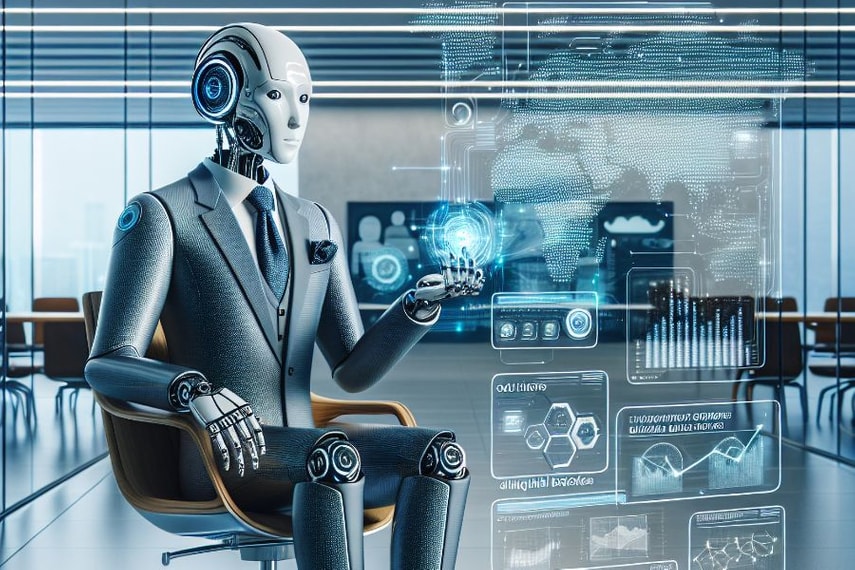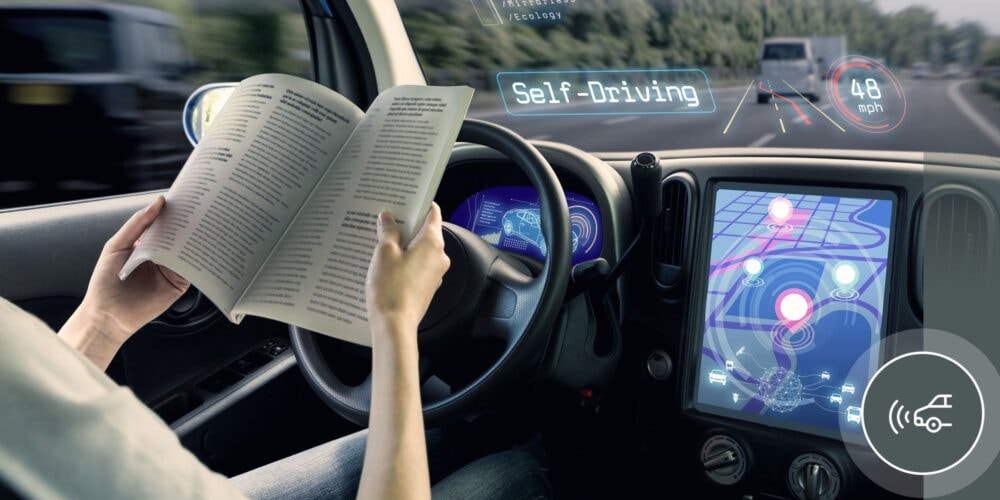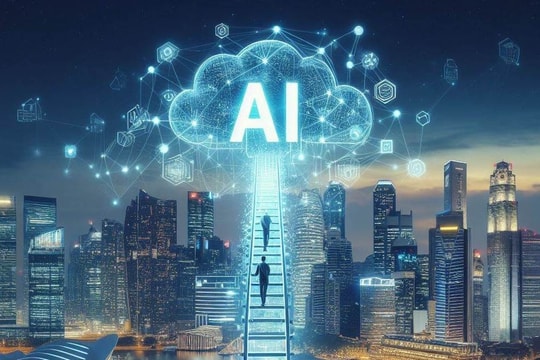Forecasting 7 disruptive technology trends in 2025
Technology is evolving at a breakneck pace, and 2025 promises to be a year of explosive innovation. Let’s take a look at 7 disruptive technology trends that could become a reality in 2025.
Technology is evolving at a rapid pace, turning science fiction dreams into reality right before our eyes.
If in the past, bulky computers were considered the pinnacle of data processing power, now a compact phone possesses many times more outstanding performance.
The explosive growth of artificial intelligence (AI) has taken familiar devices to a new level.
.jpg)
Phones are no longer just communication tools but have become smart assistants that can translate languages in real time during conversations, helping to erase the distance between people all over the world.
AI also brings a host of advanced features, from voice recognition, smart suggestions, image processing, task management to predicting user behavior to personalize the experience.
Here are seven disruptive technology trends that will likely become reality by 2025.
1. AI agents reach their full potential
It’s no surprise that AI will continue to make great strides in the coming years. One area that could explode with potential is AI agents, intelligent programs designed to receive goals from humans and automatically figure out the best way to achieve them.
Imagine a world where AI not only assists but actually acts on behalf of humans in many different areas. AI agents can automatically write code, opening up opportunities for people without programming skills to develop their own software, apps, or even games.
This could reshape the entire technology industry, helping businesses save costs and improve performance.

Going further, we could see fully automated car factories, where AI-controlled robots handle every step, from assembly to quality control.
In finance, AI agents can evaluate and approve mortgage applications without human intervention. Instead of using multiple separate apps on a smartphone, users can interact with a single AI agent that can perform a series of tasks with just a few commands.
The combination of AI agents and robots promises to create a real revolution. We will no longer just program robots to mimic human behavior, but also allow them to reason and respond directly to us.
One of the bright candidates for AI agent technology is Optimus, a humanoid robot developed by Tesla. According to billionaire Elon Musk, Tesla plans to deploy Optimus internally in 2025 before expanding to other businesses in 2026.
In addition, AI agents are also gradually taking over specialized fields such as project management. According to the forecast of the consulting company Gartner (USA), by 2030, about 80% of project management tasks will be performed entirely by AI, helping businesses optimize processes and improve performance like never before.
Clearly, we are entering the era of proactive AI, where intelligent agents not only assist but also perform work independently, ushering in a future where technology truly changes the way humans work and innovate.
2. Personalize products/services, with the help of AI
In traditional education, curriculums are often designed along fixed paths, with predetermined start and end points, spanning several years.
But imagine a completely flexible learning system, where each course is personalized based on each student’s unique experiences, skills, and abilities. In the US, these personalized training programs are being explored with the help of AI.
Not only adjusting teaching content and methods, AI can also recognize the mental and physical state of learners at each moment to optimize the educational experience.
For example, AI can fine-tune your study schedule based on your sleep from smartwatch data, ensuring you absorb knowledge in the best conditions.
Education isn’t the only sector that could benefit from AI’s customizability, however. According to Irish consultancy Accenture, businesses could one day train their own large language models (LLMs), the technology behind AI chatbots like ChatGPT.
These models will be trained on industry-specific data, making them more effective in specific areas. However, to do this, companies will need huge amounts of data.
To overcome this challenge, another trend is emerging, the development of small language models (SLMs). Unlike LLMs, SLMs are designed to handle tasks with higher accuracy without requiring huge amounts of data or powerful computing power.
This allows them to run seamlessly on personal devices such as smartphones, tablets, or laptops without relying too much on cloud data centers. With this advancement, 2025 could see a quantum leap in the personalization of technology experiences across many fields.
3.Towards the construction of a practical quantum computerin practice
Developments in the field of quantum computing are opening the door to machines that can handle complex problems far beyond the capabilities of most traditional computers.

Instead of focusing solely on increasing the number of qubits – the basic processing unit of quantum computers – researchers are now turning to fixing the errors that the technology is prone to.
This is a major step forward, bringing us closer to quantum computers that can actually operate stably and offer significant advantages over classical computing systems.
4.Promote combinationbetween the real world and the virtual world
Virtual reality (VR), augmented reality (AR) and mixed reality (MR) technologies are becoming more popular in many fields, promising to create impressive immersive experiences.
While virtual reality immerses users in a world entirely created by computers, augmented reality adds digital elements to the real environment, allowing users to still see the space around them. Mixed reality is a flexible combination of the two technologies, creating diverse levels of interaction between the physical and virtual worlds.
Currently, some head-mounted devices (HMD) have strongly supported these technologies, typically Apple Vision Pro or Meta Quest. It is expected that by 2025, the market can welcome many breakthrough products and innovations from Apple, Meta and other technology companies, helping virtual reality and augmented reality technology get closer to widespread application in life.
5.Blockchain technology is applied in many fields
Blockchain technology is revolutionizing many fields, from supply chains, healthcare to finance, thanks to its ability to store data in a decentralized, highly secure and transparent way.
With blockchain, product traceability becomes more precise than ever, ensuring transparency and enhancing traceability from production to consumers. At the same time, automated processes on the blockchain platform help optimize performance, reduce costs and improve reliability.

In the healthcare sector, blockchain can significantly improve the security of patient data, making the sharing of medical information more seamless and trustworthy. In addition, this technology also supports the tracking of medical equipment and supplies supply chains, ensuring product quality and preventing counterfeiting.
In finance, blockchain enables transactions to be fast, secure and cost-effective, while expanding access to banking and lending to people who have never had access to them before. With its enormous potential, this technology promises to reshape the global financial system, bringing about a higher level of financial inclusion than ever before.
6.Setting global standards for 6G technology
While 5G networks are still being deployed globally, researchers and technology corporations have begun laying the foundations for 6G, with the ambition of creating a revolutionary mobile information system.
According to the roadmap, the standardization process of 6G technology will officially begin in 2025, marking an important step in building infrastructure and setting technical standards.

For this technology to be successfully deployed, it is extremely important to establish clear global standards and ensure compatibility between telecommunications networks. This will help 6G devices operate smoothly worldwide, avoiding technology fragmentation between countries and suppliers.
In addition to speeds many times faster than 5G, 6G is expected to open up breakthrough applications such as Integrated Sensing and Communication (ISAC), Intelligent Internet of Things (AIoT), and support advanced technologies such as extended reality (XR) or metaverse.
Not just limited to the telecommunications sector, 6G also plays a fundamental role in automation industries, telemedicine, smart cities and many other fields.
With the rapid development of technology, the coming years will witness a fierce race between major powers and telecommunications corporations to gain an advantage in the 6G era.
7. Technologymore advanced self-driving cars
Self-driving car technology is expected to make significant strides in the coming time, moving closer to the goal of achieving fully autonomous vehicles. Currently, self-driving cars are classified into 6 levels, based on their level of autonomy, from level 0 (completely human-controlled) to level 5 (fully autonomous, without any human intervention).
Currently, a number of self-driving taxi services are being deployed in major US cities such as San Francisco, mostly operating at level 4, which means they can handle most traffic situations without a driver, but still have certain limitations.

These vehicles can operate without a driver under specific conditions, such as on designated routes or within restricted areas. However, they cannot yet handle unexpected or complex situations beyond their control.
2025 could mark major steps towards level 5, where vehicles can operate fully autonomously without a driver or any human assistance.
Mercedes is expected to upgrade its Drive Pilot self-driving system to increase speed and handling in real-world traffic conditions. Meanwhile, Tesla is also developing Robotaxi, a driverless taxi, with plans to launch before 2027, according to Elon Musk.
If level 5 is achieved, self-driving cars will open a new era for smart transportation, helping to reduce human-caused accidents and change the way we move in the future.
In short, we are entering an era where technology can not only assist humans but can also take over tasks that were once considered the exclusive domain of human minds and hands.
Intelligent systems will automatically perform work, analyze data and generate reports without direct human intervention, helping to improve work efficiency and create breakthrough changes in the office environment.
Not only stopping at the labor field, technology also contributes to improving the quality of life, expanding entertainment space and personalizing daily experiences.
From artificial intelligence that helps create content, to sophisticated virtual assistants that help manage time, technology will help people have more time for hobbies, family and personal development.

.jpg)



